Programme Schedule
![]() Download the Programme in pdf
Download the Programme in pdf
![]() Download the Exhibition Guide in pdf
Download the Exhibition Guide in pdf
| The whole morning session will be moderated by Clive Cookson, Science Editor, Financial Times | ||||||||
| 09:00 - 09:45 |
 Keynote Speaker: Josh Bongard: "How Evolution Shapes the Way Roboticists Think"
Keynote Speaker: Josh Bongard: "How Evolution Shapes the Way Roboticists Think" |
 |
||||||
| 09:45 - 10:15 |
 Political Welcome address to conference participants by
Political Welcome address to conference participants by- Neelie Kroes, Vice President of the European Commission, - Zoltán Cséfalvay, Minister of State for Economic Strategy and Parliamentary Affairs, Ministry for National Economy, Hungary - József Pálinkás, President of the Hungarian Academy of Sciences |
|||||||
| 10:15 - 10:20 |
 Opening of the exhibition
Opening of the exhibition- Neelie Kroes, Vice President of the European Commission, - Zoltán Cséfalvay, Minister of State for Economic Strategy and Parliamentary Affairs, Ministry for National Economy, Hungary |
|||||||
| Coffee break | ||||||||
| 10:45 - 11:00 (postponed to Thursday morning) |
 Perspectives on Future and Emerging Technologies
Perspectives on Future and Emerging Technologies- Wolfgang Boch, Head of Unit, FET Proactive, European Commission - Aleš Fiala, Head of Unit, FET Open, European Commission |
|||||||
| 11:10 - 11:45 |
 Official Launch of FET-Flagship Pilots by
Neelie Kroes, Vice President of the European Commission
Official Launch of FET-Flagship Pilots by
Neelie Kroes, Vice President of the European Commission |
|||||||
| 12:00 - 13:00 |
 Panel Discussion on the topic "Large vs. Small"
Panel Discussion on the topic "Large vs. Small"Panelists: Jacques Stern, Agence Nationale de la Recherche, France; Robert Madelin, Director General for Information Society and Media, European Commission; Norbert Kroo, ERC and Hungarian Academy of Sciences, Hungary; Paul Verschure, University Pompeu Fabra, Barcelona, Spain; Maria Da Graça Carvalho, Member of the European Parliament (tbc); Paul 't Hoen, Eindhoven Technical University, The Netherlands; Jerzy Langer, Foreign Secretary, Academia Europaea, Poland |
|||||||
| Lunch | ||||||||
| 14:00 | Opening of Science Café |  |
||||||
| 14:30 - 16:00 | Parallel Sessions | |||||||
|
||||||||
| Coffee break | ||||||||
| 16:30 - 18:00 |
 Keynote Speaker: Artur Ekert: "Is the age of computation yet to begin?"
Keynote Speaker: Artur Ekert: "Is the age of computation yet to begin?" |
|||||||
 Keynote Speaker: Gábor Prószéky: "The (hopefully near) future of human language technologies"
Keynote Speaker: Gábor Prószéky: "The (hopefully near) future of human language technologies" |
||||||||
| 18:00 - 19:00 | Poster Session 1 | |||||||
| 20x20 Presentations - Session 1 | ||||||||
| 20:00 - 22:00 | Reception at the Palace of Miracles | |||||||
| 09:30 - 10:15 |
 Keynote Speaker: John Pendry: "The Science of Invisibility"
Keynote Speaker: John Pendry: "The Science of Invisibility" |
 |
 |
|||||
| Coffee break | ||||||||
| 10:45 - 12:15 | Parallel Sessions | |||||||
|
||||||||
| Lunch | ||||||||
| 14:00 - 14:45 |
 Keynote Speaker: Jean-Philippe Bouchaud: "The endogenous dynamics of markets: price impact and feedback loops"
Keynote Speaker: Jean-Philippe Bouchaud: "The endogenous dynamics of markets: price impact and feedback loops" |
|||||||
| 14:45 - 15:15 |
 Awards ceremony
Awards ceremonyAwards will be handed over to the 3 best exhibits and posters resulting from the vote of the conference participants. |
|||||||
| The closing session will be moderated by Mario Campolargo, Director, Emerging Technologies and Infrastructures, European Commission | ||||||||
| 15:15 - 15:30 |
Political closing addresses to conference participants -  Mario Campolargo, Director - European Commission Emerging Technologies and Infrastructures, European Commission
Mario Campolargo, Director - European Commission Emerging Technologies and Infrastructures, European Commission-  Tamás Fellegi, Minister for National Development, Hungary
Tamás Fellegi, Minister for National Development, Hungary |
|||||||
| 15:30 - 16:00 |
 Closing performance
Closing performance"TanGO - Touching Music", an artistic performance for dancers and voice, Casa Paganini - InfoMus, University of Genoa |
|||||||
FET Flagship: Official Launch

Joining forces in Europe to target futuristic technologies
fet11 will mark the official launch of the FET Flagship Pilots by Neelie Kroes, Vice President of the European Commission.
Future and Emerging Technologies (FET) is the EU pathfinder programme in information technologies. Now the European Commission raises its ambition to coordinate a Europe-wide research effort towards visionary technological targets. The endeavour takes shape in the FET Flagship Initiatives. FET Flagships are large-scale, science-driven and mission oriented initiatives that aim to achieve a visionary technological goal. The scale of ambition is over 10 years of coordinated effort, and a budget of up to one billion Euro for each Flagship. They initiatives are coordinated between national and EU programmes and present global dimensions to foster European leadership and excellence in frontier research. To prepare the launch of the FET Flagships, 6 Pilot Actions are funded for a 12-month period starting in May 2011. In the second half of 2012 two of the Pilots will be selected and launched as full FET Flagship Initiatives in 2013.
Speakers
- Hans Lehrach, Max Planck Institute for Molecular Genetics, Berlin, Germany (ITFoM Flagship Pilot)
- Jari Kinaret, Chalmers University of Technology, Sweden (GRAPHENE Flagship Pilot)
- Steven Bishop, University College London, UK (FuturICT Flagship Pilot)
- Henry Markram, EPFL, Switzerland (Human Brain Project Flagship Pilot)
- Paolo Dario, Scuola Superiore Sant'Anna, Pisa, Italy (RoboCom Flagship Pilot)
- Adrian Ionescu, EPFL, Switzerland (Guardian Angels Flagship Pilot)
Flagship Pilot Sessions
Six sessions are dedicated to introduce the FET Flagships Pilots on Tuesday, 5 May.
More information on FET Flagship Initiatives
http://cordis.europa.eu/fp7/ict/programme/fet/flagship/home_en.htmlhttp://www.facebook.com/#!/pages/FET-Flagships/141589582520429
Large vs. Small
"Large vs. Small" will be the motto of the moderated high-level panel discussion. Panellists will discuss, from scientists and policy makers' perspectives, how grand scientific challenge driven research and open research agendas complement each other, and their future roles in the common framework on research and innovation.
Panellists
- Jacques Stern, Agence Nationale de la Recherche, France
- Robert Madelin, Director General for Information Society and Media, European Commission
- Norbert Kroo, ERC and Hungarian Academy of Sciences, Hungary
- Paul Verschure, University Pompeu Fabra, Barcelona, Spain
- Maria Da Graça Carvalho, Member of the European Parliament (tbc)
- Paul 't Hoen, Eindhoven Technical University, The Netherlands
- Jerzy Langer, Foreign Secretary, Academia Europaea, Poland
Moderator: Clive Cookson, Financial Times, London, UK
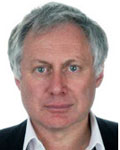
Rodney Douglas
Computational Neuroscience, Neuroinformatics, Neuromorphic SystemsTitle: "Constructive Cortical Computation"
Abstract: During the past century ever more sophisticated methods have been developed for constructing and programming computing and manufacturing machines. However, these methods are essentially forward processes that depend on intelligent human designers and programmers. They stand in stark contrast to Biology's methods of self-construction used to evoke the flexible information processor that is the mammalian neocortex. Understanding this radically different approach that uses algorithmic self-programming and construction could have enormous consequences for future computing and manufacturing technologies. In this talk we describe progress towards understanding these principles through detailed simulation of the development of the neocortex.
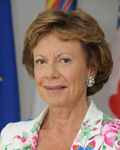
Neelie Kroes
Vice President of the European CommissionNeelie Kroes is no stranger to ICT research and innovation, having been involved in funding such work since the early 1980s.
Biography: From February 2010 Kroes has been a Vice President of the European Commission and is leading implementation of the Digital Agenda for Europe - the EU's new comprehensive action plan to harness ICTs to drive growth and address social challenges. Kroes will be mobilising industry, national governments, other stakeholders and her colleagues to deliver on 31 pieces of legislation and 101 targets by the end of her term in 2015. At the top of the list is the EU's commitment to deliver 'broadband for all'
Known for her pragmatic and straight-talking approach, Kroes has a formidable delivery record. She has also won fans as an ongoing champion of open data and open standards.
Prior to her roles in Brussels, Kroes was President of Nyenrode University from 1991-2000, and served on the boards of a string of major companies such as Lucent Technologies, Volvo, and P&O Nedlloyd.
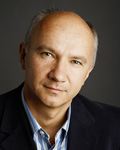
Artur Ekert
Quantum information technologyTitle: "Is the age of computation yet to begin?"
Abstract: The theory of classical universal computation was laid down in 1936, was implemented within a decade, became commercial within another decade, and dominated the world's economy half a century later. This success story relied on progress in technology. As computers become faster they must become smaller. The history of computer technology has involved a sequence of changes from one type of physical realisation to another - from gears to relays to valves to transistors to integrated circuits and so on. The unavoidable step to the quantum level will be one in this sequence; but it promises something more exciting as well. For the first time since the invention of the general purpose computer, a change in underlying hardware can give computers qualitatively new functionality. Quantum theory is already important in the design of microelectronic components. Soon it will be necessary to harness quantum theory, rather than simply take it into account. I will describe our quest to understand quantum theory, our efforts to develop quantum technology to support quantum computation, and our surprise and excitement once we discovered that nature already employs coherent quantum phenomena in biological systems. There is so much potential in this fundamentally new way of harnessing nature that it appears as though the age of computation has not yet even begun!
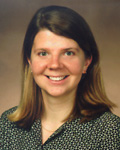
Claire Tomlin
Software technologies, computer technology, computational complexity, agent-based systemsTitle:"Mathematical models to help understand developmental biology and cancer"
Abstract: As the understanding of cellular regulatory networks grows, system dynamics and behaviors resulting from feedback effects of such systems have proven to be sufficiently complex so as to prevent intuitive understanding. Mathematical modeling in engineering and in physics or chemistry has traditionally sought to extrapolate from existing information and underlying principles to create complex descriptions of various systems, which could be analyzed or simulated, and from which further abstractions could be made. However, in studying biological systems, often only incomplete abstracted hypotheses exist to explain observed complex patterning and functions.
The challenge has become to show that enough of a network is understood to explain the behavior of the system. Mathematical modeling must simultaneously characterize the complex and nonintuitive behavior of a network, while revealing deficiencies in the model and suggesting new experimental directions. In this talk, we describe the process of modeling two biological networks: planar cell polarity in development, and treated regulatory networks in breast cancer. We demonstrate the use of the mathematical models, both in understanding the system behavior, and in suggesting new treatments.
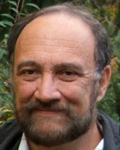
Gábor Prószéky
human language technologies, natural language processing, parallel applications, neuro-linguisticsTitle: "The (hopefully near) future of human language technologies"
Abstract: Todayâs language technology applications usually rely on either human-designed rules (used sequentially by computers) or large amount of sequential data, that is, spoken or textual corpora. Today, computer modeling of human language abilities does not use parallel methods. In current natural language processing paradigms the notion of parallelism is almost totally missing. Multi-core processors are nowadays available even in commercial computers. On the other hand, results of brain research are quite far from existing language technology applications. Applying parallelism would lead us to a more realistic architecture for language understanding, with an increased processing speed.
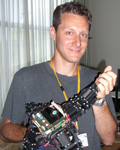
Josh Bongard
Robotics, bionics, bio-inspired processes, self-repairTitle: "How Evolution Shapes the Way Roboticists Think"
Abstract: Roboticists, by necessity, are keen students of biology: we hope to create machines that are as agile, adaptive and intelligent as the organisms we see around us. However, roboticists tend to copy the end products of evolution (compliant limbs, neural circuits, legged gaits) rather than evolutionary processes themselves (selection pressures, developmental programs). In this talk I will show how re-creating evolution in a computer can allow us to design robots automatically, rather than trying to build them manually.
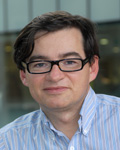
Jean-Philippe Bouchaud
Finance, economy, socio-technical systemsTitle: "The endogenous dynamics of markets: price impact and feedback loops"
Abstract: We review the evidence that the erratic dynamics of markets is to a large extent of endogenous origin, i.e. determined by the trading activity itself and not due to the rational processing of exogenous news. In order to understand why and how prices move, the joint fluctuations of order flow and liquidity â and the way these impact prices â become the key ingredients. Impact is necessary for private information to be reflected in prices, but by the same token, random fluctuations in order flow necessarily contribute to the volatility of markets. Our thesis is that the latter contribution is in fact dominant, resulting in a decoupling between prices and fundamental values, at least on short to medium time scales. We argue that markets operate in a regime of vanishing revealed liquidity, but large latent liquidity, which would explain their hyper-sensitivity to fluctuations. More precisely, we identify a dangerous feedback loop between bid-ask spread and volatility that may lead to microliquidity crises and price jumps. We discuss several other unstable feedback loops that should be relevant to account for market crises: imitation, unwarranted quantitative models, pro-cyclical regulation, etc.
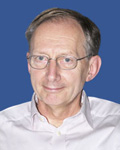
John Pendry
Optics and metamaterialsTitle: "The Science of Invisibility"
Abstract: Refractive materials give limited control of light: we can fashion lenses, and construct waveguides, but complete control is beyond simple refracting materials. Ideally we might wish to channel and direct light as we please just as we might divert the flow of a fluid. Manipulation of Maxwellâs equation shows that we can achieve just that and metamaterials open the door to this new design paradigm for optics, providing the properties required to give complete control of light. One potential application would be to steer light around a hidden region, creating a cloak of invisibility.
Science Café
The Science Café is the casual meeting place for discussions at fet11. Anyone can participate, or even start their own discussion. The Science Café will be open during the whole conference and host inspiring ignite-style 20x20 presentations.
Friday 6 May
13:15 - 14:00
Science Café with Gábór Proszéky "Research and business: Between the lab and the start-up"
Science Café
The Science Café is the casual meeting place for discussions at fet11. Anyone can participate, or even start their own discussion. The Science Café will be open during the whole conference and host inspiring ignite-style 20x20 presentations.
Thursday 5 May 2011
10:45 - 11:30
Science Café with Artur Ekert "Can information technology avoid quantum revolution?"
13:15 - 14:00
Science Café with Rodney Douglas "Can technology mimic biological self-construction?"
15:45 - 16:30
Science Café with Claire Tomlin "Humans and automation: how do we design automated systems that work well with people?"
17:30 - 19:00
Ignite Talks: Your ideas for Future Information Science and Technology
(20x20 presentations - Session 2):
- Janos Perczel: "Invisibility Cloaking"
- Ozgur Akan: "There's a Plenty of Room for Communication Networks at the Bottom!"
- Ignacio Llatser: "Graphene-based Wireless Communication Networks at the Nanoscale"
- Greet Bilsen: "Pervasive ICT: The quest for low energy and privacy"
- Andrea Vitaletti: "The 'dark side' of Green Computing"
- Virginia Dignum: "CoSA: next generation social cognitive, situational awareness to support decision making"
- Serge Kernbach: "Bio- and Chemo- Hybrid Robotics: a Way of Approaching Synthetic Life?"
- Pavel Kordik: "Collaborative Interactive Evolution in Knowledge Discovery"
- Robert Wechsler: "Music Through Movement - an Intuitive Expression Tool for Persons with Handicaps"
The Science Café is animated with the support of László Bacsárdi and István Lám from Budapest University of Technology and Economics.
Science Café
The Science Café is the casual meeting place for discussions at fet11. Anyone can participate, or even start their own discussion. The Science Café will be open during the whole conference and host inspiring ignite-style 20x20 presentations.
Wednesday 4 May 2011
14:00 - 14:45
Science Café with Josh Bongard
"Crowdsourcing Science(?)"
How the wisdom of the crowd can be harnessed to invigorate robotics research in particular, and 21st century science in general?
15:00 - 15:45
Science Café with Robert Madelin, Director General for Information Society and Media, European Commission "What more should be done to empower Young Scientists in Europe?"
18:00 - 19:00
Ignite Talks: Your ideas for Future Information Science and Technology
(20x20 presentations - Session 1):
- Michael Smyth: "UrbanIxD: An inter-disciplinary network"
- István Fehérvári: "Complexity on the workbench"
- Tatiana Ryabukha: "On Interplay Statistical Mechanics and Life Sciences in Globalization Perspective"
- Giovanni E Pazienza: "The Future of Computation"
- Cyril Velikanov: "Mass Online Deliberation: How to Make it a Reality?"
- Alan Winfield: "Can Robots teach us anything about Culture?"
- Laura Margheri: "The octopus: biomechanical measurements of a biological model for novel soft-robotics design principles"
The Science Café is animated with the support of László Bacsárdi and István Lám from Budapest University of Technology and Economics.
ITFoM - IT Future of Medicine (FET Flagship Pilot)

As data-intensive analysis and computer intensive modelling technologies become common clinical practice, IT capacity and organisation will become key limiting factors in medicine. Indeed the development of a new, data-rich, individualised medicine, likely to surpass the demands of all other IT development fields.
Experts in the field will outline what is being done to develop this IT driven, data rich, individualised medicine of the future.
Speakers
- Hans Lehrach, Max Planck Institute for Molecular Genetics, Berlin, Germany
- Hans Westerhoff, University of Manchester, UK
- Kurt Zatloukal, Medical University of Graz, Austria
- Tim Hubbard, Wellcome Trust Sanger Institute, UK
- Angela Brand, Maastricht University, The Netherlands
- Peter Boyle, International Prevention Research Institute, Lyon, France
Contact: Hans Lehrach
Primary affiliation: Max Planck Institute for Molecular Genetics, Berlin, Germany
Web Site: http://www.molgen.mpg.de/research/lehrach/
Download the extended abstract in pdf

Room: Lehár
Date: Thursday 05 May, 14:00
Robocom - The Dream of Robot Companions for Citizens (FET Flagship Pilot)

Discover how a new generation of robot technologies is working to create Robot Companions to help out at home, in work and in hospitals. With their soft bodies and new levels of perceptual, cognitive and emotive capabilities, Robot Companions will be aware of their physical and social world and respond accordingly.
The session - in form of a "live science talk-show" will feature real robots as well as video and other multi-media material to demonstrate the Robot Companions vision.
Speakers
- Paolo Dario, Scuola Superiore Sant'Anna, Italy
- Barbara Mazzolai, Center of MicroBioRobotics, IIT@SSSA, Italy
- Giorgio Metta, Italian Institute of Technology, Italy
- Pieter Roelfsema, University of Amsterdam, Netherlands Institute for Neuroscience , The Netherlands
- Rolf Pfeifer, Department of Informatics, ETH Zurich, Switzerland
- Giulio Sandini, Italian Institute of Technology, Italy
- Jackie Scully, PEALS (Policy, Ethics & Life Sciences) Research Centre, Newcastle University, UK
(to-be-confirmed)
- Wolfram Schultz, University of Cambridge, UK (to-be-confirmed)
- Paul Verschure, University Pompeu Fabra, Barcelona, Spain
Download the extended abstract in pdf

Room: Lehár
Date: Thursday 05 May, 11:00
The FuturICT Knowledge Accelerator: Creating Socially Interactive Information Technologies for a Sustainable Future (FET Flagship Pilot)

Experts from the FuturICT flagship pilot project will discuss its aims to understand and manage complex, global, socially interactive systems, with a focus on sustainability and resilience.
Integrating ICT, Complexity Science and the Social Sciences will create a paradigm shift, facilitating a symbiotic co-evolution of ICT and society
Download the extended abstract in pdf

Speakers
- Steven Bishop, University College, London, UK
- David Price, University College, London, UK
- Roland Siegwart, ETH, Zurich, Switzerland
- Dirk Helbing, ETH, Zurich, Switzerland
- Paul Lukowicz, University of Passau, Germany
- Rosaria Conte, Institute of Cognitive Sciences and Technologies, Rome, Italy
- Lászlo Barabási, University of Notre Dame, Indiana, USA
Room: Bartók
Date: Thursday 05 May, 14:00
Guardian Angels for a Smarter Life (FET Flagship Pilot)

Discover the key concepts and technologies of Guardian Angels autonomous systems-of-systems featuring sensing, computation, and communication beyond human capabilities. Find out how Guardian Angels will provide assistance to people from infancy to old age. Foreseen are individual health support, monitoring of ambient conditions for environmental threats, and emotional man-machine interfaces. A series of selected talks will present the features of systems-of-systems and the major challenges of zero power requirements as these Guardian Angels will scavenge for energy and they will exploit ultra low power technologies. Applications scenaria will be summarized by a short movie.
Speakers
- Hervé Fanet, CEA-LETI, France: "Technological platform: novel functionality and disruption versus reality check"
- Francis Balestra, SINANO, France: "Fundamental scientific challenges and limits for ultra low energy computation"
- Christofer Hierold, ETHZ, Switzerland: "Ultra low power nano sensors"
- Enrico Sangiorgi, IUNET, Italy: "Fundamental scientific challenges and limits for energy harvesting"
- Kevin Sivula, EPFL, Switzerland: "Energy conversion inspired by nature"
- Georges Gielen, KUL, Belgium: "Design strategies for ultra low power systems-of-systems"
- Daniel Bertrand, HiQScreen, Switzerland: "Guardian Angels: breakthrough toward e-Health"
- Robert Plana, CNRS, France: "Energy efficient communications"
- Adrian Ionescu, EPFL, Switzerland: "One billion Euros for Zero Power Guardian Angels?"
Download the extended abstract in pdf

Room: Bartók
Date: Thursday 05 May, 11:00
Graphene-Driven Revolutions in ICT and Beyond (FET Flagship Pilot)

Find out how graphene has the potential to make a profound impact in ICT. Integrating graphene components with silicon-based electronics, and gradually replacing silicon in some applications, allows not only substantial performance improvements, but also enables completely new applications.
The session will feature presentations on graphene science and technology and on the organisation of a pilot project to develop the research agenda for the flagship initiative: Graphene-Driven Revolutions in ICT and Beyond.
Speakers
- Andrea Ferrari, Cambridge University, UK
- Jari Kinaret, Chalmers University, Sweden
- Vladimir Falko, Lancaster University, UK
- Jani Kivioja, NOKIA, Finland
Session organiser: Jari Kinaret
Primary affiliation: Chalmers University, Sweden
Download the extended abstract in pdf

Room: Bartók
Date: Thursday 05 May, 16:00
The Human Brain Project (FET Flagship Pilot)

Find out how the Human Brain Project is working to create the informatics, modeling and supercomputing technologies required to build biologically detailed models of the human brain.
The HBP team will present the project's goals, rationale and strategy and explore its its potential impact, including the possibility of a new generation of brain-enabled robots.
Speakers
- Henry Markram, EPFL, Switzerland: Introducing the HBP
- Sten Grillner, Karolinska Institutet, Sweden: Brain simulation for a new kind of neuroscience
- Thomas Lippert, Jülich Supercomputing Centre, Germany: Brain simulation and the future of supercomputing
- Richard Frackowiak, CHUV, Switzerland: Brain simulation for the diagnosis and treatment of brain disease
- Kris Verstreken, IMEC, Leuven, Belgium: New interfaces to the brain
- Karlheinz Meier, University of Heidelberg, Germany: Brain simulation as a source of neuromorphic technology
- Alois Knoll, Technical University Munich, Germany: Brain simulation and robotics
Download the extended abstract in pdf

Room: Lehár
Date: Thursday 05 May, 16:00
The Future Museum
Find out how innovations from the worlds of ICT and multimedia have revolutionised the way in which museums operate. Now imagine how museums could look in the future.
The Future Museum proposes a breakthrough in the museum concept opening up the possibility of live interaction between scientists, artists, designers, intellectuals and the wider population.
Speakers
- Enzo Badalotti, Mediacontech, Milano, Italy
- Luca de Biase, Nova-il Sole 24 ore, Italy
- Peter Greenaway, Artist and director, UK
- Sander ban der Leeuw, Department of Anthropology Arizona State University, USA
Session organiser: Enzo Badalotti
Primary affiliation: Mediacontech, Milano, Italy
Position: CEO Mediacontech Group
Web Site: http://www.mediacontech.it
Room: Brahms
Date: Wednesday 04 May, 14:30
Robots as Companions: What can we Learn from Servants and Companions in Litterature, Theater, and Film?
Truffaldino, Sancho Pansa, Figaro, Jeeves, Schwejk, and many, many more ... authors, dramatists, film makers have given us rich pictures of servants and their masters. The organisers invite all conference participants to experience and to explore their influence on and significance for the future of social robotics.
Speakers
- Zsófia Ruttkay, University of Twente, The Netherlands,
- Markus Krajewski, Bauhaus-University, Weimar, Germany
- Virgil Widrich, University of Applied Arts, Vienna, Austria
Session organiser: Robert Trappl
Primary affiliation: Austrian Research Institute for Artificial Intelligence, Vienna, Austria
Position: Head of Institute
Web Site: http://www.ofai.at
Room: Brahms
Date: Thursday 05 May, 14:00
Building Future Information Technologies with Artificial Atoms in Diamond
Find out how defects in diamonds can be put to use for the development of future nano-electronic devices. The session will be accompanied by a demonstration experiment to show how the magnetic resonance of the nitrogen-vacancy colour centre can be optically detected and applied to the measurement of weak magnetic fields.
Speakers of the session are involved in several EU-funded projects illustrating important contribution made by the European Commission in the development of strategic technologies.
Speakers
- Jean-Francois Roch, Ecole Normale Supérieure de Cachan, France: "Overview of the field"
- Daniel Twitchen, Element 6, UK: "The engineering of diamond material based on CVD growth, and defect incorporation"
- Christian Eggeling, Max-Planck-Institut für biophysikalische Chemie, Göttingen, Germany: "Recent advances in optical 'nanoscopy'"
- Fedor Jelezko, Universität Ulm, Germany: "How NV centers can be used for sensing magnetic and electric fields"
Session organiser: Jean-Francois Roch
Primary affiliation: Ecole Normale Supérieure de Cachan, Cachan, France
Room: Bartók
Date: Wednesday 04 May, 14:30
Fundamental Frontiers of Quantum Science and Technology
The session focuses on modern advances in the foundations of quantum physics and a selection of routes towards new quantum technologies.
It explores the current frontiers in basic research with complex quantum systems, covering photonic, atomic, molecular and micromechanical systems as well as challenges for quantum theory.
Speakers
- Anton Zeilinger, University of IQOQI, Vienna, Austria: "Quantum science and technology: exciting fundamental challenges and opportunities"
- Domenico Giulini, University of Hannover, Germany: "The impact of gravity on quantum evolution"
- Jean-Michel Raimond, ENS Paris, France: "Exploring the frontiers of the quantum world with atoms and cavities"
- Angelo Bassi, University of Trieste, Italy: "Spontaneous collapse models in the light of modern experiments"
- Antoine Heidmann, ENS Paris, France: "Radiation pressure, photons and mechanical resonators: towards quantum optomechanics"
- Markus Arndt, University of Vienna and Vienna Center for Quantum Science and Technology, Austria: "Quantum information in molecular quantum optics: from Schrödinger cats to quantum sensing"
Session organiser: Markus Arndt
Primary affiliation: University of Vienna and Vienna Center for Quantum Science and Technology, Vienna, Austria
Web Site: http://www.quantumnano.at
Room: Bartók
Date: Friday 06 May, 10:45
Quantum Effects in Biology and their Applications to Light Harvesting and Sensing
What is the role that quantum effects play in biological functions, and how can this understanding help us develop novel devices, namely more efficient solar cells and finer sensing?
Leading experts in the field address the question of detecting and understanding the role of quantum effects in biological systems, including its more fundamental and theoretical aspects.
Speakers
- Greg Engel, University of Chicago, USA
- Martin Plenio, University of Ulm, Germany
- Luca Turin, BSRC Fleming, Athens, Greece
Session organiser: Yasser Omar
Primary affiliation: CEMAPRE, ISEG, Technical University of Lisbon, Portugal, Lisbon, Portugal
Room: Pátria
Date: Thursday 05 May, 14:00
Atoms, Photons and Entanglement for Quantum Information Technology
Crucial challenges in the implementation of Quantum Information Technologies call for smart strategies. This discussion aims to provide an overview of recent progress achieved by the combination of different photon–quantum matter approaches towards finding solutions.
Three talks, delivered by international leaders in the field, will cover a variety of experimental and theoretical features. A main focus of the presentations will be to outline future scenarios, to address the problems in play and to look at the progress made so far meeting these challenges.
Speakers
- Eugene Polzik: "status of the art in the realization of quantum interfaces and quantum memories"
- Dieter Meschede: "discrete quantum simulations with neutral atoms"
- Julio Barreiro: "open systems quantum simulations with trapped ions"
Session organiser: Ennio Arimondo
Primary affiliation: Università di Pisa, Pisa, Italy
Room: Lehár
Date: Wednesday 04 May, 14:30
Complex Systems for an ICT-enabled Energy System
Learn more about the ways in which Complex Systems Science has a role to play in the modelling, control, simulation, and governance of the future Energy System.
This session aims to lay the foundations for the creation of a new research community able to formulate innovative approaches in the area of energy system modelling and governance, paving the way for future European-scale initiatives.
Speakers
- Pablo Viejo , European Institute for Energy Research, Germany;
- Carlos Álvarez, The Innaxis Research Institute, Madrid, Spain
- Nikos Hatziargyriou, National Technical University of Athens, Greece
Session organiser: David Perez
Primary affiliation: The Innaxis Research Institute, Madrid, Spain
Position: Director
Web Site: http://www.innaxis.org
Room: Pátria
Date: Thursday 05 May, 11:00
Innovation, Sustainability and ICT
Cascades of innovation can take society in directions that nobody intended beforehand and that are very hard to adjust en route. They combine force with a lack of control in a way that is unsettling even when the effects seem mostly positive, but can be disastrous when their destructive potentials dominate.
Find out what steps are being taken to consolidate a deeper understanding of the dynamics of innovation cascades and the implications of this understanding for the design of innovation policy processes that monitor them.
Speakers
- David Lane, University of Modena and European Center for Living Technology, Italy
- Sander van der Leeuw, School of Sustainability, Arizona State University and Santa Fe Institute, USA: core ideas of INSITE on Innovation and Sustainability
- Claes Andersson, Chalmers Institute of Technology, Sweden: Modeling pragmatics for innovation policy
- Filippo Addarii, Euclid Network, London, UK
- Alberto Massini-Zannetti, TheHub, London, UK and Milano, Italy: Social innovation
Session organiser: David Lane
Primary affiliation: University of Modena, Italy
Web Site: http://www.cei.unimo.it
Room: Mozart
Date: Friday 06 May, 10:45
Agent Based Modeling
What are the achievements and possibilities for Agent Based Modeling, as applied in the context of social sciences, economics and finance, and what are its weak points?
Leading exponents in the field will lead a theoretical discussion while the demands and expectations of practitioners and decision makers will be highlighted by a senior European official.
Speakers
- Nigel Gilbert, University of Surrey, UK: "Understanding housing markets with agents"
- Domenico Delli Gatti, Catholic University of Milan, Italy: "Macroeconomics from the Bottom Up"
- Doyne Farmer, Santa Fe Institute, New Mexico, USA: "Agent-based modeling of financial stability: A current example and a vision of the future"
- Werner Röger, DSGE modeling unit, Directorate General for Economic and Financial Affairs, European Commission
Session organiser: Imre Kondor
Primary affiliation: Department of Physics of Complex Systems, Eötvös University, BUDAPEST, Hungary
Position: professor of physics
Room: Mozart
Date: Thursday 05 May, 16:00
Artificial Synapses: Memristors
Can we break/repair the neural code by only reading/writing high-resolution precise intracellular ‘words’ spoken by single neurons? Or is it necessary to record/replay low-resolution ‘pictures’ of the extracellular population activity, as it integrates information both in time and space ?
Experimental brain scientists, computational neuroscientists, experts in enabling technologies for invasive neuroprosthetics and who ever is interested are invited to join the debate following presentation by experts in the field.
Speakers
- Julie Grollier, CNRS, Palaiseau, France: "An introduction to memristors"
- Bernabe Linares-Barranco, IMSE-CNM-CSIC, Sevilla, Spain: "How to compute with memristors : dedicated bio-inspired architectures"
- Themis Prodromakis, Imperial College London, UK: "Titanium di-oxide memristor"
- Vincent Garcia, CNRS, Palaiseau, France: "Ferroelectric memristor"
- Viktor Erokhin, University of Parma, Italy: "Organic memristor"
- André Chanthbouala, Thales-TRT, Palaiseau, France: "Spintronic memristor"
- Yusuf Leblebici, EPFL, Switzerland: "Silicon nanowire memristors and their applications for synaptic functions"
- Christian Gamrat, CEA List-Leti, Saclay, France: "Memristor: the ideal Synapse"
Session organiser: Julie Grollier
Primary affiliation: Unité Mixte de Physique CNRS-Thales, Palaiseau, France
Position: Researcher, coordinator of the NanoBrain ERC starting grant team
Web Site: http://www.trt.thalesgroup.com/ump-cnrs-thales/phonebook/grollier.htm
Room: Liszt
Date: Wednesday 04 May, 14:30
Computational Social Choice
How should we aggregate the preferences of a group of individuals so as to arrive at an adequate collective preference, which can serve as the basis for making acceptable group decisions?
This session will provide an introduction to the field of Computational Social Choice and demonstrate how it can contribute to addressing some of the major challenges associated with realising the next generation of decision making technologies in areas such as e-governance, electronic commerce, the semantic web, school choice, or transplant organ allocation systems.
Speakers
- Peter Biro, Institute of Economics, Hungarian Academy of Sciences, Hungary
- Ioannis Caragiannis, Department of Computer Engineering and Informatics, University of Patras
Greece
- Britta Dorn, Faculty of Mathematics and Economics, University of Ulm, Germany
-Ulle Endriss, Institute for Logic, Language and Computation, University of Amsterdam, The Netherlands
- Jerome Lang, LAMSADE Laboratory, CNRS and Paris-Dauphine University, France
- Francesca Rossi, Department of Pure and Applied Mathematics, University of Padova, Italy
Session organiser: Ulle Endriss
Primary affiliation: ILLC, University of Amsterdam, The Netherlands
Position: Assistant Professor
Web Site: http://www.illc.uva.nl/
Room: Mozart
Date: Wednesday 04 May, 14:30
Evolvability of Natural and Artificial Systems
In what sense is natural evolution open-ended and can this be replicated in artificial evolution?
A panel of experts will attempt to answer this and other questions as part of a session on the evolvability of natural and artificial systems.
Speakers
- Dario Floreano, EPFL, Switzerland
- Mauro Santos, University of Barcelona, Spain
- Chrisantha Fernando, University of Sussex, UK
- George Kampis, Eötvös Loránd University, Budapest, Hungary
Session organiser: Eörs Szathmáry
Primary affiliation: Collegium Budapest (Institute for Advanced Study), Hungary
Web Site: http://www.colbud.hu
Room: Pátria
Date: Wednesday 04 May, 14:30
Heaven and Hell: Visions for Pervasive Adaptation
User heaven or user hell? Technology experts in artificial intelligence, adaptive systems, ambient environments and pervasive computing discuss the technological benefits and useful applications of pervasive adaptation, but also its potential threats.
Based on themes from the PerAda book ‘This Pervasive day’, and featuring authors from the PerAda projects, it will appeal to anyone interested in the personal, social, economic and political impacts of pervasive, ubiquitous and adaptive computing.
Speakers
The session will be chaired by Ben Paechter, Edinburgh Napier University.
- Ben Paechter, Edinburgh Napier University, UK
- Jeremy Pitt, Imperial College London, UK
- Nikola Serbedzija, Fraunhofer FIRST, Germany
- Katina Michael, University of Wollongong, Australia
Session organiser: Jennifer Willies
Primary affiliation: Edinburgh Napier University, UK
Web Site: http://www.perada.eu
Room: Brahms
Date: Thursday 05 May, 11:00
From a Spike-Centered Brain Universe to its Underlying Synaptic Landscape: Future Technologies for Brain Reverse Engineering and Neuroprosthetic
Can we break/repair the neural code by only reading/writing high-resolution precise intracellular ‘words’ spoken by single neurons? Or is it necessary to record/replay low-resolution ‘pictures’ of the extracellular population activity, as it integrates information both in time and space ?
Experimental brain scientists, computational neuroscientists, and experts in enabling technologies for invasive neuroprosthetics, and whoever is interested, are invited to join the debate following a presentation by experts in the field.
Speakers
- Luc Gentet, EPFL, Switzerland
- Michele Giugliano, University of Antwerp, Belgium
- Micha Spira, Hebrew University of Jerusalem, Israel
- John Simeral, Brown University, USA
Session organiser: Michele Giugliano
Primary affiliation: University of Antwerp, Belgium
Position: Professor
Web Site: http://www.ua.ac.be
Room: Liszt
Date: Thursday 05 May, 11:00
Solving Problems with Visual Analytics
In a world where we are bombarded by an increasing amount of data on a daily basis, time and money are wasted because we lack the ability to adequately deal with it.
Visual analytics is an emerging research discipline which aims to make the best possible use of huge information loads in a wide variety of applications by appropriately combining the strengths of intelligent automatic data analysis with the visual perception and analysis capabilities of the user.
Speakers
- Daniel Keim, Computer Science department of the University of Konstanz, Germany
- Margit Pohl, Vienna University of Technology, Austria
- Gennady Andrienko, Fraunhofer Institute IAIS, Sankt Augustin, Germany
- Giuseppe Santucci, Department of Computer and System Science at the University of Rome "La Sapienza", Italy
Session organiser: Jörn Kohlhammer
Primary affiliation: Fraunhofer IGD, Darmstadt, Germany
Position: Head of Department
Web Site: http://www.igd.fraunhofer.de
Room: Mozart
Date: Thursday 05 May, 11:00
Biological and Chemical Information Technology: Bottom-Up Chemistry and Synthetic Biology
Biological and chemical information technology (bio/chem IT) is one of the most vibrant and important emerging research domains in recent years, especially with the growth of research into systems and synthetic biology, artificial cells, chemical information processing, micro-electro-mechanical systems, nanotechnology and artificial intelligence.
This session will present scientific results in the field, focussing on bottom-up chemistry and synthetic biology. Particular attention will be paid to bio/chem IT outside Europe, through the presentation of our plenary speaker.
Speakers
Plenary speaker:
- Farren Isaacs, Yale University, USA
Short presentations will also be given by representatives of the current core COBRA project:
- Steen Rasmussen, University of Southern Denmark, Denmark
- John McCaskill, Ruhr University, Bochum, Germany
- Peter Dittrich, Friedrich Schiller University, Jena, Germany
- Martyn Amos, Manchester Metropolitan University, UK
Session organiser: Martyn Amos
Primary affiliation: Manchester Metropolitan University, Manchester, UK
Position: Reader in Novel Computation
Web Site: http://www.cobra-project.eu/fet11.html
Room: Liszt
Date: Thursday 05 May, 14:00
Brain-Chip Interfaces: The Present And The Future
Brain-chip interfacing is becoming a key and powerful technology with multiple applications to investigate neuronal and brain function and to develop new devices for therapy of neurological diseases.
This session focuses on recent achievements in Brain-Chip Interfacing and provides a general overview of world-wide progress in the field.
Speakers
- Roland Thewes, Technical University of Berlin, Germany
- Roeland Huys, IMEC, Leuven, Belgium
- Stefano Vassanelli, University of Padova, Italy
- Paul Verschure, University Pompeu Fabra, Barcelona, Spain
- Wolfgang Eberle, IMEC, Leuven, Belgium
Session organiser: Stefano Vassanelli
Primary affiliation: University of Padova, Italy
Position: Professor
Web Site: http://www.anatomiafisiologia.unipd.it/neurochip/Index.html
Room: Mozart
Date: Thursday 05 May, 14:00
The City in Cinema: How Popular Culture can Influence Research Agendas
Where can researchers find inspiration for the transformative applications, concepts and infrastructures that they believe will characterise the next decade?
One approach to predicting the future is to reflect on the visions of the future that have been proposed in the past, and question how these visions are actively shaping our present. This session looks at the way in which cinema's portrayal of the future city has been a source of inspiration for scientists, technologists and commentators.
Speakers
- Michael Smyth, Edinburgh Napier University, UK
- Ingi Helgason, Edinburgh Napier University, UK
- Ivica Mitrović, Arts Academy, University of Split, Croatia
- Gianluca Zaffiro, Telecom Italia, Torino, Italy
Session organiser: Ingi Helgason
Primary affiliation: Edinburgh Napier University, UK
Position: Researcher
Room: Brahms
Date: Thursday 05 May, 16:00
Talking with Chemicals: Challenges of Biomimetic Infochemical Communication
Find out about a new form of biomimetic chemical communication with a demonstration involving both robots and insects. Speakers will provide an overview of the biological and technological inspiration for a project that aims to demonstrate how this new class of technology could be realized. Hear the latest advances and convergence of expertise in the fields of pheromone biochemistry, molecular biology, neuroscience, microengineering and bioelectronics.
Speakers
- Bill Hansson, Max Planck Institute for Chemical Ecology, Jena, Germany
- Paul Verschure, University Pompeu Fabra, Barcelona, Spain
- Shannon Olsson, Max Planck Institute for Chemical Ecology, Jena, Germany
- Zoltan Racz, University of Warwick, Coventry, UK
Session organiser: Zoltan Racz
Primary affiliation: University of Warwick, Coventry, UK
Position: Postdoctoral Research Associate
Web Site: http://go.warwick.ac.uk/ichem
Room: Liszt
Date: Thursday 05 May, 16:00
Soft Robotics: Theories and Technologies
In contrast to the conventional robotics research, the investigations of Soft Robotics focus on the use of soft and deformable materials in the robot bodies, dynamic changes of morphology and mechanical passive dynamics for agile motor capabilities, and sensory-motor control for gentle system- environment interactions.
In this session, we discuss how Soft Robotics has been developed in the last decades, what progress have been made and what stage are we at now. This session brings together leading scientists to discuss strategic research collaborations together with important theoretical and technological issues which will lead to high impact applications and innovation in the near future.
Speakers
Plenary speaker:
- Hod Lipson, Cornell University, USA
Showcase of technologies:
- Cecilia Laschi, Scuola Superiore Sant'Anna, Pisa, Italy
- Dario Floreano, EPFL, Switzerland
- Liyu Wang, ETH Zurich, Switzerland
- Fumiya Iida, ETH Zurich, Switzerland
Panel discussion:
- Paolo Dario, Scuola Superiore Sant'Anna, Pisa, Italy
- Rolf Pfeifer, University of Zurich, Switzerland
- Josh Bongard, University of Vermont, USA
Session organiser: Fumiya Iida
Primary affiliation: Bio-Inspired Robotics Lab, ETH Zurich, Switzerland
Position: Professor
Web Site: http://www.birl.ethz.ch/
Room: Pátria
Date: Thursday 05 May, 16:00
Sustainable ICT: Micro and Nanoscale Energy Management
ICT energy isues form the basis of this session which brings together international experts interested in the realization of efficient low-power ICT devices.
What are the basic mechanisms behind the heat production and how can we take advantage of the fluctuations instead of avoiding them? The aim is to understand the energy management physical mechanisms at nanoscale with a view to setting the bases for a new thermodynamics of ICT devices.
Speakers
- Leonardo Alfonsi, European Science Events Association, Austria
- Adrian Ionescu, Ecole Politechnique Fédérale de Lausanne, Switzerland
- Fabio Marchesoni, Università di Camerino, Italy
- Bruno Michel, ETH Zurich / IBM Research, Switzerland
- Eric Pop, University Illinois & Beckman Inst, Urbana, USA
- Georgios Fagas, Tyndall Institute, Ireland
- Ralph Stübner, European Commission, ICT-FET Proactive
Session organiser: Luca Gammaitoni
Primary affiliation: NiPS Laboratory, Dipartimento di Fisica, Università di Perugia, Italy
Position: Director of Noise in Physical System Laboratory, University of Perugia
Web Site: http://www.nipslab.org
Room: Lehár
Date: Friday 06 May, 10:45
Pervasive Socio-Technical Fabric
Leading experts in their field outline the challenges to pervasive systems research as well as looking ahead to the next grand challenge: Pervasive Socio-Technical Fabric.
The session will also include a discussion on the Pervasive Adaptation Research Agenda Book which has been compiled by collecting about 100 research issues and challenges from not only outstanding European researchers, but also from the whole worldwide scientific community, as well as from industrial stakeholders.
The proposed networking session will take the form of a live debate, primed by short, 7 minute talks by four experts in the field who will each outline research challenges towards Socio-technical Pervasive Fabric from their own background.
Speakers
- Norbert Streitz, Smart Future Initiative, Germany
- Albert Schmidt, University of Duisburg-Essen, Germany
- Nigel Davies, University of Arizona, USA and Lancaster University, UK
- Alois Ferscha, University of Linz, Dept. of pervasive computing, Austria
Session organiser: Alois Ferscha
Primary affiliation: University of Linz, Dept. of Pervasive Computing, Linz, Austria
Position: Professsor, Head of Department
Web Site: http://www.pervasive.jku.at
Room: Brahms
Date: Friday 06 May, 10:45
Vision Restoration and Vision Chip Technologies
Find out how bionic vision devices could help blind people to regain some of their sight. This session will look at how retinal implants, bionic glasses and the genetic modification of retinal cells to recreate light sensitivity can all help with vision restoration.
The session will also look at how vertically integrated vision chip technology is bringing about a revolution in the design of artificial vision systems.
The session is jointly chaired by Ákos Kusnyerik and Ákos Zarándy.
Speakers
Botond Roska, Fiedrich Miescher Institute for Biomedical Research, Switzerland
Ákos Kusnyerik, Rózsakert Medical Center, Hungary
Angel Rodriguez-Vazquez, Instituto de Microelectronica de Sevilla - CNM-CSIC, Spain
Kristof Karacs, PPKE Információs Technológiai Kar, Hungary
Ákos Zarándy, MTA SZTAKI, Budapest, Hungary
Session organiser: Ákos Zarándy
Primary affiliation: MTA SZTAKI, Budapest, Hungary
Room: Liszt
Date: Friday 06 May, 10:45
Robots Interacting with Humans – Embodied Intelligence for Better Robots
Can robots move towards becoming a companion in everyday life?
Experts in the field explore design and control ideas for a new generation of robots that can co-exist and co-operate with people and get much closer to the human manipulation and locomotion performance than today’s robots do.
Speakers
Speakers:
- Alin Albu-Schäffer, DLR – German Aerospace Center, Germany
- Dino Accoto, Campus Bio-Medico University, Roma, Italy
- Antonio Bicchi, University of Pisa, Italy
- Maria Chiara Carrozza, Scuola Superiore Sant’Anna, Pisa, Italy
- Herman van der Kooij, Twente University, Enschede, The Netherlands
- Bram Vanderborght, Vrije Universiteit Brussel
Session organiser: Alin Albu-Schäffer
Primary affiliation: DLR, German Aerospace Center, Oberpfaffenhofen, Germany
Position: Head of Department
Web Site: http://www.dlr.de
Room: Pátria
Date: Friday 06 May, 10:45



 Conference
Conference 





